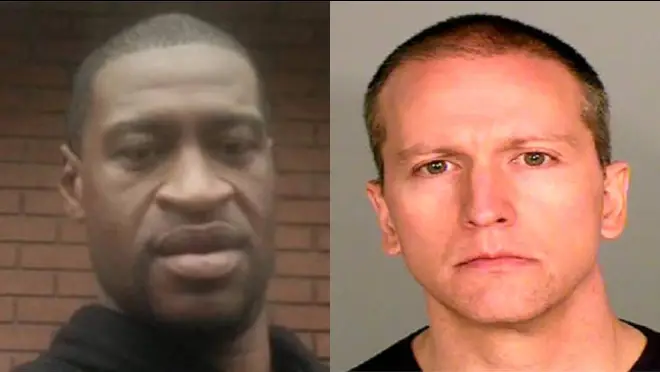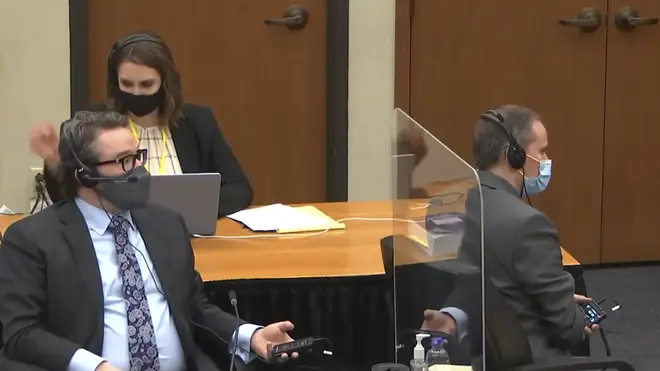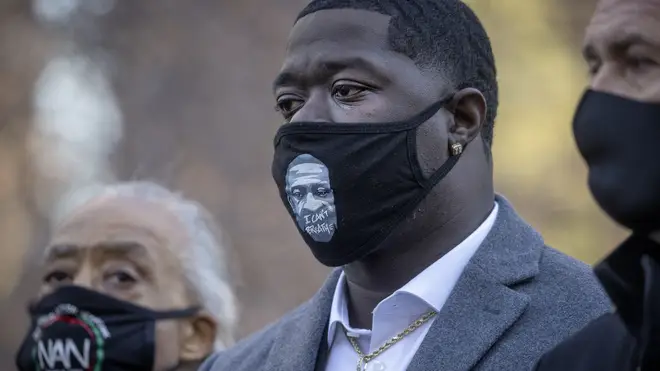
Henry Riley 3pm - 6pm
29 March 2021, 22:17 | Updated: 29 March 2021, 22:19

Jurors have been shown a video of George Floyd gasping for breath during the trial of former police officer Derek Chauvin.
The video of Mr Floyd gasping for breath was front and centre as a former police officer who pressed his knee on the black man’s neck went on trial on charges of murder and manslaughter.
Prosecutor Jerry Blackwell showed jurors the footage at the earliest opportunity, during opening statements, after telling them the number to remember was nine minutes and 29 seconds — the amount of time officer Derek Chauvin had Mr Floyd pinned to the pavement in Minneapolis last May.
The white officer “didn’t let up” even after a handcuffed Mr Floyd said 27 times that he could not breathe and went limp, Mr Blackwell said in a case that triggered worldwide protests, scattered violence and national soul-searching over racial justice.
“He put his knees upon his neck and his back, grinding and crushing him, until the very breath – no, ladies and gentlemen -until the very life was squeezed out of him,” the prosecutor said.
Mr Floyd, 46, was declared dead after Chauvin was filmed by passers-by pressing his knee into his neck for almost nine minutes.
Chauvin continued to hold the position despite Mr Floyd's cries of "I can't breathe" and his body going limp, in scenes that shocked the world and sparked global protests after being shared on social media.

Derek Chauvin’s defence team has told the jury at his trial that George Floyd's death was "about more than just nine minutes and 29 seconds" as a witness is expected to say that Mr Floyd was under the influence of drugs before his death.
Mr Chauvin’s lawyer, Eric Nelson, said the case is "clearly about more than just nine minutes and 29 seconds".
He also revealed that one of the defence’s witnesses will be an employee of Cup Foods, a store where Mr Floyd allegedly used fake money.
The employee is expected to say that he observed Mr Floyd under the influence well before his encounter with Chauvin.
“The evidence will show that Mr Floyd died of a cardiac arrhythmia, that occurred as result of hypertension, coronary disease, the ingestion of methamphetamine and fentanyl, and adrenaline flowing through his body,” he told the court.

Ahead of the start of the trial, George Floyd's family lawyer, Benjamin Crump said: "George Floyd was living and breathing just fine until the police put a knee on his neck.
"Today starts a landmark trial that will be a referendum on how far America has come in its quest for equality," he said.
Opening statements in the case were beginning this afternoon. Courts have carried out a long and careful selection process for choosing jurors due to the sensitivity and significance of the case.
Those chosen were questioned for more than two weeks and almost all of them said they had seen at least parts of the infamous footage and several acknowledged it gave them at least a somewhat negative view of Chauvin. However, they said they could set that aside.
Chauvin, 45, is one of four officers involved in the incident and faces the most serious charges. He is charged with unintentional second-degree murder, third-degree murder and manslaughter. The trial is expected to last four weeks.
Read more: City of Minneapolis to pay $27m to George Floyd's family over his death
Read more: Third-degree murder charge reinstated in Derek Chauvin trial

Jury selection paused in trial over George Floyd death
It is likely jurors will be shown the bystander video, which sparked outrage and activism across the US and beyond, early in proceedings.
Prosecutors have not said when they will play the footage, but legal experts expect it to be early in the trial - potentially in their opening statements.
"If you're a prosecutor you want to start off strong. You want to frame the argument - and nothing frames the argument in this case as much as that video," said Jeffrey Cramer, a former federal prosecutor and managing director of the Berkeley Research Group in Chicago.
Chauvin's trial is taking place at the courthouse in downtown Minneapolis.
The building has been fortified with concrete barriers, fencing, and barbed wire due to fears among city and state leaders that there could be a repeat of the damaging riots that followed Mr Floyd's death. National Guard troops have also been mobilised.
Read more: Chauvin to be charged with second-degree murder over Mr Floyd death
Read more: Police officer charged with George Floyd's death freed from jail

George Floyd’s niece delivers passionate speech
The key questions at the trial will be whether Chauvin caused the 46-year-old's death and whether his actions were reasonable.
For the unintentional second-degree murder charge, prosecutors have to prove the ex-police officer's conduct was a "substantial causal factor" in Mr Floyd's death, and that Chauvin was committing felony assault at the time.
For third-degree murder, they must prove that Chauvin's actions caused Mr Floyd's death and were reckless and without regard for human life.
The manslaughter charge requires proof that the former cop caused Mr Floyd's death through negligence that created an unreasonable risk.
After jury instructions, prosecutors will begin with their opening statement, providing a roadmap of their case and telling jurors what they can expect to see at the trial, said Mike Brandt, a local defence lawyer who is watching the case closely. They will outline what is to come, highlighting key witnesses.

George Floyd laid to rest
It is believed Chauvin's defence lawyer, Eric Nelson, will use his opening statement to push back on the prosecution's argument and tell jurors that medical testimony and use of force experts will show a different view.
Fifteen jurors will appear in court on Monday when the case starts, but Hennepin County Judge Peter Cahill said the 15th was chosen simply to ensure that 14 would be in place once the trial begins.
He is expected to dismiss that person immediately.
Two of the remaining 14 will be alternates - who sit in on the case in the event one of the selected jurors needs to be dismissed prior to the trial concluding - but the court has not made clear which ones.
Jury selection took more than two weeks, as jurors were questioned individually about their views on police, racial justice issues and pre-trial publicity in the case.